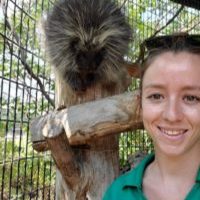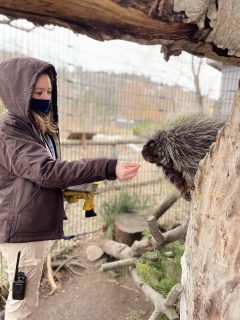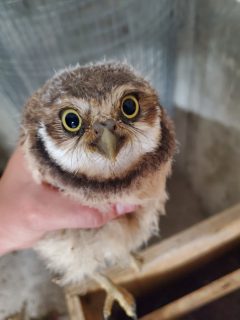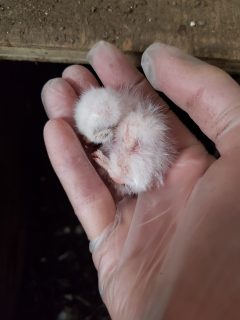
Amy Walker B.Sc.
Zookeeper
| Degrees: | B.Sc. Hons Biology (2016) Concentration in Ecology, Evolution and Behaviour |
Where do you work now?
Currently I work as a zookeeper at the British Columbia Wildlife Park in Kamloops, BC. I started my position in October 2020. Previously I worked for 3 years as a zookeeper in Ottawa, followed by about 7 months as a vet assistant at an animal hospital.
How would you describe your role?
Zookeepers are responsible for the daily care of the resident animals. On the most basic level, I am responsible for the daily feeding, and cleaning of the animals under my care.
However, zookeeping encompasses so much more as well! I am also responsible for developing and implementing enrichment that encourages natural behaviours in the animals, maintaining and progressing husbandry training to meet training goals, enclosure design and maintenance, record keeping, and engaging with the public. Ultimately, I am responsible for ensuring that the animals in my care are thriving.

Amy feeding Quilla (Photo: Amy Walker)
What does a typical day involve?
The day starts with a quick meeting with the whole animal care team, to go over what’s new for the day/ week etc. The rest of the day is spent tending to the animals in your care, and their enclosures. All of the animals are cared for on a loose schedule, based on their needs, with some needing to be fed twice a day, some fed only in the morning or late afternoon etc. Each of the animals also have their own routines, and so some may require shifting into a different area before heading in to clean, for others we can enter the enclosure and safely be on the same side as that animal.
While working with each animal or section, the enclosure is cleaned, water is changed, and food is fed out. How they are fed is dependent on the species, since we do our best to mimic the way that species would find food in the wild. Any training can also be worked on, using positive reinforcement. An example of this would be how this year we were able to train our arthritic camel to voluntarily line up his hip along a wall, so that we can safely inject his arthritis medication into the presented hip, greatly improving his quality of life.
While working in a section or enclosure I can also implement any enrichment for the day. The complexity of enrichment and frequency depends on the species and individual in question. An example of this could be stuffing large pine cones with food items, and placing them throughout the porcupine enclosure. The pine cones act as a new tactile experience for the porcupine, since they need to be manipulated to get to the food. They are also a new scent that isn’t usually within the enclosure, and since they are placed all around the enclosure they encourage wild-like foraging behaviour and exploration.

Burrowing owl (Photo: Amy Walker)
Once all my animals have been cared for the day, I will input any new notes or observations, feeding details, or medical details into our record keeping software. Clean up of kitchen areas is then done as a team, and the day is done!
One of the aspects of zookeeping that I really enjoy is how it is almost near impossible to plan exactly how your day will go. Medical emergencies can occur, unpredicted enclosure maintenance has to be dealt with, training can take longer than expected if the animal chooses not to participate, vehicles break down, equipment breaks, coworkers get sick and their animals need to be cared for, and the list goes on and on. You certainly have to be flexible and able to adapt to the ever-changing day!
As a student, were there experiences or opportunities that helped you get such a position?
Having a degree in general will greatly help you get into this field. That being said, I am very grateful for the diversity of classes I was able to take while at Carleton, specifically in my 3rd and 4th years. The knowledge gained in classes with subject matter in conservation, ecology, animals/plants/insects has been so helpful and relevant throughout my last 4 years as a keeper. Educating the public is a big part of zookeeping, and so that knowledge base has proved extremely useful over the years.
The zoo that I currently work at also functions as a rehabilitation facility, taking in local wild animals that are in need of care. Being able to I.D species, and know their natural histories has been helpful in knowing what these animals need while they stay in our hospital facility. In a less direct way, I believe that all the lab work has played a part in developing my observation and attention to detail skills, two skills that are absolutely crucial and used every day in any animal care role.
Do you have any advice for students interested in pursuing a similar path?
For anyone wanting to get in to zookeeping, any kind of animal experience can be very beneficial. This can include volunteering, interning etc. Any time you get to work with any animals you will learn an incredible amount that can be used for the rest of your career.
In Canada, there are only 28 CAZA accredited facilities, meaning that there are only 28 workplaces across the entire country that follow a set of animal welfare standards and are inspected on a regular basis. If you want to stay within accredited facilities, this does mean that the positions don’t pop up very regularly, and so if there is an opportunity available my advice would be to jump on it and see what happens. If it doesn’t work out, keep trying and stay positive!
This job and industry is unlike any other. The work can be very labour intensive, emotionally straining, and extremely rewarding all at the same time. But if you work hard, and have the passion driving you then you can accomplish anything!

Amy caring for a baby burrowing owl